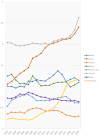The advancement of artificial intelligence in biomedical research and health innovation: challenges and opportunities in emerging economies
- PMID: 38773458
- PMCID: PMC11107016
- DOI: 10.1186/s12992-024-01049-5
The advancement of artificial intelligence in biomedical research and health innovation: challenges and opportunities in emerging economies
Abstract
The advancement of artificial intelligence (AI), algorithm optimization and high-throughput experiments has enabled scientists to accelerate the discovery of new chemicals and materials with unprecedented efficiency, resilience and precision. Over the recent years, the so-called autonomous experimentation (AE) systems are featured as key AI innovation to enhance and accelerate research and development (R&D). Also known as self-driving laboratories or materials acceleration platforms, AE systems are digital platforms capable of running a large number of experiments autonomously. Those systems are rapidly impacting biomedical research and clinical innovation, in areas such as drug discovery, nanomedicine, precision oncology, and others. As it is expected that AE will impact healthcare innovation from local to global levels, its implications for science and technology in emerging economies should be examined. By examining the increasing relevance of AE in contemporary R&D activities, this article aims to explore the advancement of artificial intelligence in biomedical research and health innovation, highlighting its implications, challenges and opportunities in emerging economies. AE presents an opportunity for stakeholders from emerging economies to co-produce the global knowledge landscape of AI in health. However, asymmetries in R&D capabilities should be acknowledged since emerging economies suffers from inadequacies and discontinuities in resources and funding. The establishment of decentralized AE infrastructures could support stakeholders to overcome local restrictions and opens venues for more culturally diverse, equitable, and trustworthy development of AI in health-related R&D through meaningful partnerships and engagement. Collaborations with innovators from emerging economies could facilitate anticipation of fiscal pressures in science and technology policies, obsolescence of knowledge infrastructures, ethical and regulatory policy lag, and other issues present in the Global South. Also, improving cultural and geographical representativeness of AE contributes to foster the diffusion and acceptance of AI in health-related R&D worldwide. Institutional preparedness is critical and could enable stakeholders to navigate opportunities of AI in biomedical research and health innovation in the coming years.
Keywords: Artificial intelligence; Autonomous experimentation systems; Biomedical research; Drug discovery; Emerging economies; Health; Innovation; Research and development (R&D); Self-driving lab.
© 2024. The Author(s).
Conflict of interest statement
Not applicable.
Figures




References
-
- Ren F, Ding X, Zheng M, Korzinkin M, Cai X, Zhu W, Mantsyzov A, Aliper A, Aladinskiy V, Cao Z, Kong S, Long X, Man Liu BH, Liu Y, Naumov V, Shneyderman A, Ozerov IV, Wang J, Pun FW, Polykovskiy DA, Sun C, Levitt M, Aspuru-Guzik A, Zhavoronkov A. AlphaFold accelerates artificial intelligence powered drug discovery: efficient discovery of a novel CDK20 small molecule inhibitor. Chem Sci. 2023;14(6):1443–52. doi: 10.1039/d2sc05709c. - DOI - PMC - PubMed
-
- Genetic Engineering and Biotechnology News. First Application of AlphaFold in Identifying Potential Liver Cancer Drug. Feb 2023. https://www.genengnews.com/insights/first-application-of-alphafold-in-id.... Accessed 6 July 2023.
-
- Stach E, Brian DC, Kusne A, Gilad, Hattrick-Simpers J, Brown KA, Reyes, Kristofer G, Schrier CP, Gregoire JM. Mehta, Apurva, Montoya, Joseph, Olivetti, Elsa, Park, Chiwoo, Rotenberg, Eli, Saikin, Semion K., Smullin, Sylvia, Stanev, Valentin, and Maruyama, Benji. Autonomous experimentation systems for materials development: A community perspective. United States: N. p., 2021. Web. 10.1016/j.matt.2021.06.036.
Publication types
MeSH terms
LinkOut - more resources
Full Text Sources
Research Materials
Miscellaneous

